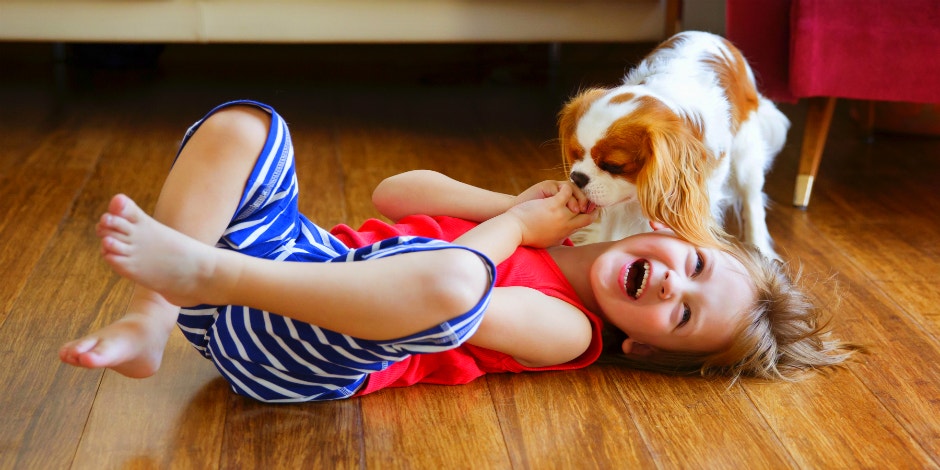How To Raise Courageous Children: 3 Steps To Helping Kids Manage Anxiety
Teaching them to tolerate their anxiety can help.
 getty
getty Courage doesn’t come naturally and is never easy for an anxious child. A courageous child has learned that courage is a choice that can be practiced: An experience that follows from fear and anxiety.
Courage is fundamentally the decision to focus on something more important than fear.
Especially for an anxious child, when facing something hard and scary, courage gives them the boost they need to face it front and center.
Practicing courage builds confidence, which in turn delivers the resources kids need to choose it again and again. A courageous child knows how to not only tolerate his anxiety but to use it.
So, how do you teach your children to use their anxiety as fuel for being brave?
Here are 3 parenting tips for dealing with anxiety in children, and how to teach them to use it to their benefit to build courage.
1. Stay connected to your kids.
The most fundamental way for you to begin helping your child be courageous is to regularly communicate with them. Whatever it takes to keep lines of communication open are worth investing in.
Communication is how you stay connected, and also how you teach your kids about ideas and values. As kids learn and absorb family values, they become better able to access and use them in their lives.
In turn, these values become the reasons to put fear aside and be brave.
Consider screen-free time together, family dinners, conversations while in the car (without your child on their phone the whole time), talking while doing projects together like shopping, closet cleaning, laundry, cooking… The possibilities are endless.
By regularly communicating with your child, you're letting them know that you care and that you're always available.
2. Model how to handle anxiety with your own behavior.
The benefit of accepting and connecting with your child as you communicate with them about their life — including their anxiety — is profound, and not just limited to helping them feel supported.
With each interaction you’re also modeling how they might choose to behave, whether or not you’re aware of it.
Children are especially tuned in to how their parents behave, and so they're more susceptible to their parents’ emotions. Emotions, including your anxiety, can be contagious.
If you're ruled by your own anxiety, you expose your children to more anxiety and also model your response to it.
Whereas when you practice acceptance, connection, and courage in the face of anxiety, you feel more control. You are teaching your children how to do these things, too.
3. Teach them how to take control of their anxiety.
There's more you can do to raise a courageous child than staying connected and modeling courage. You can teach them a step-by-step process to use their anxiety to become courageous.
The first step is to teach your child what anxiety is — in terms they can understand — so they can develop the ability to tolerate it.
In a nutshell, anxiety is a normal response to thoughts of something you care about being at risk. Caring people worry.
Anxiety can even be viewed as a super-power. People who have anxiety tend to be great problem-solvers and highly intelligent.
Once your child has a basic understanding of how helpful their anxiety can be, you can assist them in becoming more adept at recognizing when and how they're feeling anxious.
Does their worry show up as butterflies in their stomach, fear, feeling shaky, worrisome thoughts, or something else?
Identifying anxiety’s message is the next step. Anxiety’s job is to alert your child to something they care about that needs their attention. So, they need to listen to their anxiety to understand what it is trying to tell them.
Then comes identifying what they want and how to get it. By sorting through anxiety’s messages, your child can begin to determine the actions that can solve problems (which may include asking for your assistance).
Once they've determined the actions that can resolve anxiety, they're on the precipice of courage. It’s when they take action to ease worries instead of being trapped by them that they become a courageous child.
As a parent, know there is only so much you can do to raise a courageous child — and it takes time. While you really cannot teach courage, you can encourage your kids to act bravely.
It’s up to your child to choose to use their anxiety to be brave and do what they know is best for them.
Understanding that anxiety is a feeling, but being brave is an action can help your child learn that being brave doesn’t require feeling good or safe, it only requires a choice.
Dr. Alicia Clark is a licensed clinical psychologist. For more help with managing stress and anxiety, check out her anxiety blog, download her free ebook, or sign up for her newsletter.

